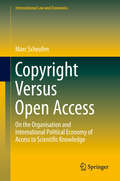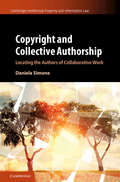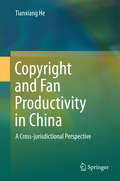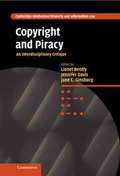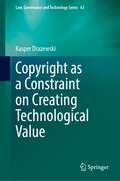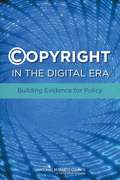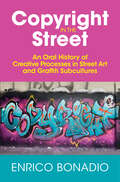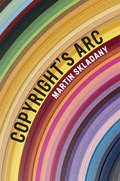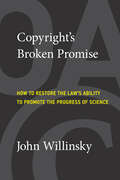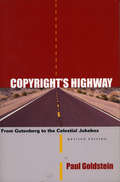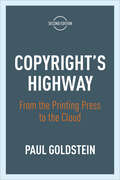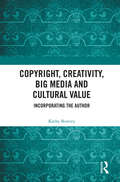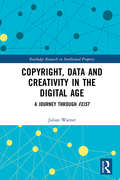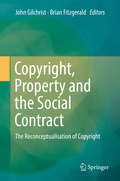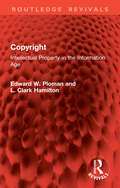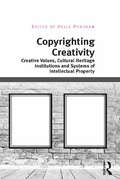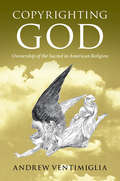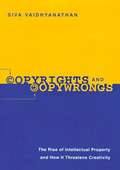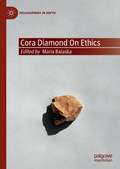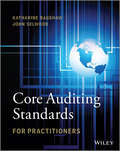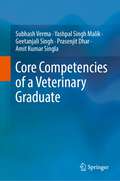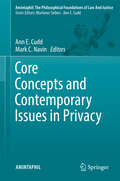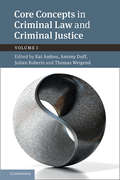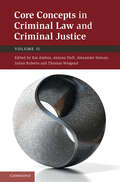- Table View
- List View
Copyright Versus Open Access: On the Organisation and International Political Economy of Access to Scientific Knowledge (International Law and Economics)
by Marc ScheufenThis book addresses the recent debate about copyright law and its impact on the distribution of scientific knowledge from an economic perspective. The focus is on the question whether a copyright regime or an open access regime is better suited to the norms and organizational structure in a purely global science community. The book undertakes a thorough economic analysis of the academic journal market and showcases consequences of a regime change. It also takes account of the Digital Divide debate, reflecting issues in developing countries. Finally, a comprehensive analysis of legal action in the light of international Intellectual Property (IP) agreements offers prospects on the future of academic publishing.
Copyright and Collective Authorship: Locating the Authors of Collaborative Work (Cambridge Intellectual Property and Information Law #50)
by Daniela SimoneAs technology makes it easier for people to work together, large-scale collaboration is becoming increasingly prevalent. In this context, the question of how to determine authorship – and hence ownership - of copyright in collaborative works is an important question to which current copyright law fails to provide a coherent or consistent answer. In Copyright and Collective Authorship, Daniela Simone engages with the problem of how to determine the authorship of highly collaborative works. Employing insights from the ways in which collaborators understand and regulate issues of authorship, the book argues that a recalibration of copyright law is necessary, proposing an inclusive and contextual approach to joint authorship that is true to the legal concept of authorship but is also more aligned with creative reality.
Copyright and Fan Productivity in China: A Cross-jurisdictional Perspective
by Tianxiang HeThis book takes a unique approach to mitigate the problem of massive online copyright infringement and justify fan activities. It argues for a cooperative approach that encourages copyright owners to exert a degree of control over their fan creators. In contrast to the current approach, which treats fan utilizations as theft, this book suggests that the copyright owners and the lawmakers should instead distinguish between fan creators and commercial pirates, allowing them unleash their potential. This book offers a clear and comprehensive account of the fascinating aspects of legal problems created by fan activities in China, Japan and the United States, offering a valuable guide for students, practitioners, academics and entrepreneurs whose work involves or who are interested in cutting-edge legal issues in the creative industry. "Tianxiang He introduces us to the world of fandom inhabited by 'fan-subbers', fan-dubbers', 'mash-uppers', and 'fan-fictionists' against the backdrop of copyright law and policy in China. His work is engaging in that it not merely describes the law, but also the political dimension where copyright and state media control converge into a reality where being an artist or a fan is not that straightforward. " -- Prof. Anselm Kamperman Sanders, School of Law, Maastricht University "The tension between copyright holders and fan communities has been increasingly salient yet underexplored. This timely, insightful and deeply engaging book not only fills a niche, but also covers a country that has been rarely examined in this context. The book advances a promising model for the two groups to cooperate. It also explores complex issues concerning political culture, media regulation and civic engagement in China. A must read for anybody interested in copyright law, cultural production, digital technology or Chinese information policy. " -- Prof. Peter K. Yu, Professor of Law and Director, Cen ter for Law and Intellectual Property, Texas A&M University School of Law
Copyright and Piracy: An Interdisciplinary Critique
by Lionel Bently Jennifer Davis Jane C. GinsburgAn understanding of the changing nature of the law and practice of copyright infringement is a task too big for lawyers alone; it requires additional inputs from economists, historians, technologists, sociologists, cultural theorists and criminologists. Where is the boundary to be drawn between illegal imitation and legal inspiration? Would the answer be different for creators, artists and experts from different disciplines or fields? How have concepts of copyright infringement altered over time and how do such changes relate, if at all, to the cultural norms operating amongst creators in different fields? With such an approach, one might perhaps begin to address the vital and overarching question of whether strong copyright laws, rigorously enforced, impede rather than promote creativity. And what can be done to avoid any such adverse consequences, while maintaining the effectiveness of copyright as an incentive-mechanism for those who need it?
Copyright and Popular Media
by Trajce CvetkovskiCopyright governance is in a state of flux because the boundaries between legal and illegal consumption have blurred. Trajce Cvetkovski interrogates the disorganizational effects of piracy and emerging technologies on the political economy of copyright in popular music, film and gaming industries.
Copyright as a Constraint on Creating Technological Value (Law, Governance and Technology Series #63)
by Kasper DrazewskiCan we regulate something that doesn’t exist yet? Can Europe create its own Silicon Valley? Who gets to create technological value in today’s world? Whatever happened to the once-flourishing idea of rags to riches? Will new and exciting innovations only ever come from big tech companies? Can the EU establish its own flexible framework for boosting innovation, e.g. by facilitating the transformative use of technologies and data?This book seeks to answer these questions by exploring the differences in copyright culture in Europe and the United States, with its flexible fair use framework. The findings are anything but obvious, and decades of case law on both sides of the Atlantic tell a story of judges going to great lengths to deal with new challenges while navigating the imperfections of statutory law – both where it is too broadly formulated and where it is too prescriptive.How can the population’s creative potential best be fostered? What do software innovations have in common with the evolution of living organisms? What are the vulnerabilities of distributed creativity? Answers are sought in the processes that came into being during the early years of the digital revolution and were then forced to take a back seat as control of the means of production was increasingly placed in the hands of tech companies. The findings and insights presented here are highly relevant for today’s digital policymaking. Market concentration processes in innovation haven’t ceased; they are ongoing. And in an age where data-driven services are creating and reinforcing global oligopolies, the question posed by the U.S. Supreme Court in Google v. Oracle is now more relevant than ever: who should hold the keys to digital innovation?
Copyright in the Digital Era
by Stephen A. MerrillOver the course of several decades, copyright protection has been expanded and extended through legislative changes occasioned by national and international developments. The content and technology industries affected by copyright and its exceptions, and in some cases balancing the two, have become increasingly important as sources of economic growth, relatively high-paying jobs, and exports. Since the expansion of digital technology in the mid-1990s, they have undergone a technological revolution that has disrupted long-established modes of creating, distributing, and using works ranging from literature and news to film and music to scientific publications and computer software. In the United States and internationally, these disruptive changes have given rise to a strident debate over copyright's proper scope and terms and means of its enforcement--a debate between those who believe the digital revolution is progressively undermining the copyright protection essential to encourage the funding, creation, and distribution of new works and those who believe that enhancements to copyright are inhibiting technological innovation and free expression. Copyright in the Digital Era: Building Evidence for Policy examines a range of questions regarding copyright policy by using a variety of methods, such as case studies, international and sectoral comparisons, and experiments and surveys. This report is especially critical in light of digital age developments that may, for example, change the incentive calculus for various actors in the copyright system, impact the costs of voluntary copyright transactions, pose new enforcement challenges, and change the optimal balance between copyright protection and exceptions.
Copyright in the Street: An Oral History of Creative Processes in Street Art and Graffiti Subcultures (Cambridge Law Handbooks Ser.)
by Enrico BonadioThis book explores how copyright laws are perceived within street art and graffiti subcultures to examine how artists and writers view certain creative aspects of their own practice. Drawing on ethnographic research and fieldwork, the book gives voice to the main actors of these communities and highlights their feelings and opinions toward issues that are increasingly impacting their everyday life and work. It also touches on related and complementary issues, such as the 'gallerisation' or economic exploitation of these forms of art and the curious similarities between the graffiti and advertising worlds. Unique and comprehensive, Copyright on the Street brings the 'voice from the street' into the debate over the legal and non-legal protection of street art and graffiti.
Copyright's Arc: The Case For Tying Intellectual Property Rights To National Wealth
by Martin SkladanyIn Copyright's Arc, Martin Skladany rejects a one-size-fits-all copyright regime. Within developed countries, copyright's incentives have spawned multinational corporations that create a plethora of slick, hyped entertainment options that encourage Americans to overconsume, whereas in developing countries, extreme copyright blocks the widespread distribution of entertainment, which impedes women's equality and human rights movements. Meanwhile, moderate copyright in middle-income countries helps foster artistic movements that forge inclusive national identities. Given these conditions, Skladany argues that copyright should vary between countries, following an arc across the development spectrum.
Copyright's Broken Promise: How to Restore the Law's Ability to Promote the Progress of Science
by John WillinskyA comprehensive proposal for reforming copyright law to ensure sustainable public access to research and scholarship.Open access is widely supported by researchers, librarians, scholarly societies, and research funders, as well as large and small publishers. Yet despite this support—and the pandemic&’s demonstration of the importance of open access for scientific progress—the scholarly publishing market is failing to deliver open access quickly enough. In Copyright&’s Broken Promise, John Willinsky presents the case for reforming copyright law so that it supports, rather than impedes, public access to research and scholarship. He draws on the legal strategy of statutory licensing to set out the terms and structures by which the Copyright Act could ensure that publishers are fairly compensated for providing immediate open access. What sets Willinsky&’s analysis apart is its focus on the current state of scholarly publishing. Because copyright offers so little legal support for moving publishing to open access, though it is best for science, he says it is time to stop regarding the Copyright Act as a law of nature that can only be circumvented, contravened, or temporarily set aside. Specifically, he proposes that the Copyright Act add a new category of work, called &“research publications,&” which would be subject to statutory licensing. This would allow publishers to receive royalty payments from the principal institutional users (universities, industry R&D, research institutes, and so on) and sponsors of the work (foundations and government agencies), while providing immediate open access.
Copyright's Highway
by Paul GoldsteinFrom eighteenth-century copyright law, to current-day copyright issues on the internet, to tomorrow's "celestial jukebox”-a digital repository of books, movies, and music available on demand-Paul Goldstein presents a thorough examination of the challenges facing copyright owners and users. One of the nation's leading authorities on intellectual property law, Goldstein offers an engaging, readable, and intelligent analysis of the effect of copyright on American politics, economy, and culture. Goldstein presents and analyzes key legal battles, including Supreme Court decisions on home taping and 2 Live Crew's contested sampling of Roy Orbison's "Pretty Woman. ” In this revised edition, the author expands the discussion to cover electronic media, including an examination of recent Napster litigation, the Digital Millennium Copyright Act, and the vexed Secure Digital Music Initiative, under which record companies attempted to develop effective encryption standards for their products. Praise for the first edition: "A clever and vibrant book that traces copyright history from the invention of the printing press through current challenges to copyright from new technologies . . . . Most compelling [on] multimedia technologies. ” -Sabra Chartrand,The New York Times "This eminent authority writes with clarity, lucidity and a wry sense of humor about a subject whose complexities can be daunting. " -Jonathan Kirsch,Los Angeles Times "A wonderfully American tale of how law, literature, politics and megabucks intersect. " -William Petrocelli,San Francisco Chronicle
Copyright's Highway: From the Printing Press to the Cloud, Second Edition
by Paul GoldsteinIn Copyright's Highway, one of the nation's leading authorities on intellectual property law offers an engaging, readable, and intelligent analysis of the effect of copyright on American politics, economy, and culture. From eighteenth-century copyright law, to the "celestial jukebox," to the future of copyright issues in the digital age, Paul Goldstein presents a thorough examination of the challenges facing copyright owners and users. In this fully updated second edition, the author expands the discussion to cover the latest developments and shifts in copyright law for a new audience of scholars and students. This expanded edition introduces readers to present and future debates regarding copyright law and policy, including a new chapter on the technological shift in emphasis from producer to consumer and the legal shift from exclusive rights to exceptions and limitations to those rights. From Gutenberg to Google Books, Copyright's Highway, Second Edition, offers a concise, essential resource for the internet generation.
Copyright, Creativity, Big Media and Cultural Value: Incorporating the Author
by Kathy BowreyAs the publishing, film and music industries are dominated by Big Media conglomerates, there is often recourse to simplistic ideological and conspiratorial readings of industry dynamics. Copyright, Creativity, Big Media & Cultural Value: Incorporating the Author explains why copyright is much more than a creator’s private property right or a mechanism through which corporations control cultural production and influence mass consumption choices. The volume is grounded in extensive, painstakingly detailed and colourful original archival research into business histories of major successful artists including Conan Doyle, Hall Caine, Margaret Atwood, Dame Nellie Melba, Radiohead and Banksy, and the industries and genres that grew up around their activities. Chapters address big questions about how copyright generates income and how distributions of profits are allocated in the publishing, film and music industries. It includes discussion of the creation of new formats, the interplay between old media and new technologies, international copyright reform and cross-industry relations. Copyright, Creativity, Big Media & Cultural Value is a wide-ranging and important resource for students and practitioners of law and policy, media studies, cultural studies and literary history.
Copyright, Data and Creativity in the Digital Age: A Journey through Feist (Routledge Research in Intellectual Property)
by Julian WarnerThe Supreme Court of the United States in Feist v. Rural (1991) required that databases must have a minimal degree of creativity for copyright. The judgment was highly significant and the subsequent period is understood as the post-Feist era. It has been globally influential. However, the decision is extremely complex and remains unsatisfactorily interpreted. In particular, it has been impossible to illuminate the creativity requirement. The book gives an account of the decision’s conceptual structure, focusing on its full delineation of the opposite to creativity. In a radical and unprecedented innovation, it is correlated with an automatic computational process. Creativity itself is understood as non-computational or directly human activity concerned with meaning. Determining the presence of creativity is reduced to a four-stage test. This work then has acute practical current relevance to property in data in the digital age; it will also be of theoretical interest to, and is aimed at, researchers in, practitioners, and students of intellectual property worldwide.
Copyright, Property and the Social Contract: The Reconceptualisation of Copyright
by Brian Fitzgerald John GilchristThis book provides international perspectives on the law of copyright in relation to three core themes - copyright and developing countries; the government and copyright; and technology and the future of copyright. The third theme includes an examination of the extent to which technology will dictate the development of the law, and a re-examination of the role of copyright in fostering innovation and creativity. As a critique, one chapter discusses how certain rights can create or reinforce social inequality under copyright royalty systems. Underlying these themes is the role the law of copyright has in encouraging or impeding human flourishing.
Copyright: Intellectual Property in the Information Age (Routledge Revivals)
by Edward W. Ploman L. Clark HamiltonFirst published in 1980, Copyright offers an explanation and an analysis of the wider implications of copyright as an instrument for ordering the flows of information and culture within and among societies. The book traces the development of copyright and related rights with emphasis on the policy aspects and on how copyright was influenced by and in its turn influenced the users of new information technology.Significant discussion is devoted to the international aspects of copyright, its unique position in international law, and its role in the relations between industrialized and developing countries. Having provided a basic understanding of copyright principles and their implications, the authors then analyse how well or badly copyright is coping with the various information and communication technologies that have developed primarily in the twentieth century. Finally, they discuss how copyright operates in a modern technological society, the existing challenges to copyright, and its prospects for the future.
Copyrighting Creativity: Creative Values, Cultural Heritage Institutions and Systems of Intellectual Property (Digital Research in the Arts and Humanities)
by Helle PorsdamWhat is the relationship between creativity, cultural heritage institutions and copyright? Who owns culture and cultural heritage? The digital age has expanded the horizon of creative possibilities for artists and cultural institutions - what is the impact on legal regimes that were constructed for an analogue world? What are the tensions between the safeguarding of cultural heritage and the dissemination of knowledge about culture? Inspired by a three year research project involving leading European universities, this book explores the relationship between copyright and intellectual property, creativity and innovation, and cultural heritage institutions. Its contributors are scholars from both the humanities and the social sciences - from cultural studies to law - as well as cultural practitioners and representatives from cultural heritage institutions. They all share an interest in the contribution of intellectual property to the role of cultural institutions in making culture accessible and encouraging new creativity.
Copyrighting God: Ownership of the Sacred in American Religion
by Andrew VentimigliaCopyrighting God provides the first detailed account of how American religious organizations used copyright in sacred texts not simply for economic gain but also for social organization and control. Including chapters on the angelic authorship of The Urantia Book, Mary Baker Eddy's use of copyright to construct the Christian Science Church, interdenominational disputes in the Worldwide Church of God, and the Church of Scientology's landmark lawsuits against Internet service providers, this book examines how religious copyright owners mobilized the law in order to organize communities, protect sacred goods, produce new forms of spiritual identity, and even enchant the material world. In doing so, this book demonstrates that these organizations all engaged in complex efforts to harmonize legal arguments and theological rationales in order to care for and protect religious media, thereby coming to a nuanced understanding of secular law as a resource for, and obstacle to, their unique spiritual objectives.
Copyrights And Copywrongs
by Siva Vaidhyanathanexplores the history of copyright law and its evolution into something akin to property law, and warns of the consequences of this trend.
Cora Diamond on Ethics (Philosophers in Depth)
by Maria BalaskaThis collection offers an in-depth look at Cora Diamond’s distinctive approach to ethics and its philosophical significance. It comprises a new essay by Cora Diamond on the policing of concepts, followed by ten original chapters by world-class scholars covering conceptual loss, moral theory, the category of the human, the moral consideration of animals, and the meaning of narcissism. Including comparisons to the work of other contemporary moral philosophers such as Martha Nussbaum, Jeff McMahan, Rai Gaita, Eva Kittay, Christine Korsgaard, and Edward Harcourt, the volume also creates interdisciplinary links between Diamond’s work and other fields of study, including psychoanalysis and contemporary ethology. Showcasing the vital importance of Diamond’s contribution to philosophy, this volume is essential reading for scholars working in ethics, philosophy of language and literature.
Core Auditing Standards for Practitioners
by Katharine Bagshaw John SelwoodThe only book on the market specifically designed to help audit staff stay ahead of inspectorsThis comprehensive, practical, and theoretical guide covers the key ISAs that underpin audit methodologies and the recently revised ISAs that cause practitioners the most concern. It is designed to enhance auditors' understanding of critical ISAs, reducing their dependence on methodologies to mediate and explain ISA requirements. Using plenty of examples, the book helps audit staff learn to tailor audit methodologies and remove redundancies, as well as form high-quality judgments with a thorough grounding in ISA to serve in discussions with file reviewers and audit inspectors.Features practical examples that appeal to auditors with technical responsibilitiesCovers key topics such as smaller audits, management override of controls, documenting judgments, and dealing with accounting estimates and written presentationsIdeal for practitioners in companies and accounting firms, as well as auditing studentsIncludes access to a companion website with constantly updating ISAs and case studiesMixing theory with practical examples, Core Auditing Standards for Practitioners provides experienced audit staff with key ISA-related information they need to succeed.
Core Competencies of a Veterinary Graduate
by Yashpal Singh Malik Subhash Verma Geetanjali Singh Prasenjit Dhar Amit Kumar SinglaThis book is an essential guide for veterinarians, veterinary faculty and policymakers for understanding the core competencies of a fresh veterinarian. The book briefly covers competencies in preclinical, paraclinical, and clinical subjects including anatomy, physiology, biochemistry, veterinary jurisprudence, animal management & welfare including nutrition and breeding, infectious and non-infectious diseases, disease epidemiology, diagnosis, and treatment, prevention, control and zoonoses, surgical and other clinical interventions. The book further includes other competencies, including biologicals, anti-mortem, and post-mortem inspection, certifications, applied one health aspects, review and analysis of scientific evidence, international trade and regulations, and organization of veterinary services. It also highlights the importance of effective communication, interpersonal skills, record keeping and management of a small veterinary hospital, health informatics, etc. The book breakdowns the must-have competencies of a global veterinarian into different topics and subtopics for easy comprehension and further learning. It enables the professional standard-setting & regulatory bodies and academicians in improved curricula designing and implementation and more importantly tries to bring uniformity in day one veterinary graduates’ competencies globally, enhancing the movement and employability of veterinarians across the world.
Core Concepts and Contemporary Issues in Privacy (Amintaphil: The Philosophical Foundations Of Law And Justice Ser. #8)
by Ann E. Cudd Mark C. NavinThis book offers a comprehensive investigation of privacy in the modern world. It collects 16 papers that look at this essential topic from many facets, from the personal to the technological, from the philosophical to the legal. The contributors examine such issues as the value of privacy protection, the violation of spreading personal falsehoods, the digital rights of children, an individual's right to be forgotten from internet search engines, and more.The organization of the volume helps provide a nuanced understanding of this often controversial topic. Coverage starts with key concepts before moving on to explore personal information privacy and the impact of new technologies. Next, the papers consider privacy in different contexts. These include work, sex, family, crime, and religion. This structure enables greater engagement with the difficult questions about privacy. Readers will gain deep insight into the core concepts of privacy as well as its application to everyday life. This interdisciplinary volume brings together an international team of scholars. They provide a broad combination of expertise in law, philosophy, and political science. Overall, this thought-provoking examination will appeal to interested readers in both academia and practice.
Core Concepts in Criminal Law and Criminal Justice: Volume 1, Criminal Law
by Kai Ambos Antony Duff Julian Roberts Thomas Weigend Alexander HeinzeAttempts at trans-jurisdictional debate and agreement are often beset by mutual misunderstanding. Professionals and academics engaged in comparative criminal law sometimes use the same terms with different meanings or different terms which mean the same thing. Although English is the new lingua franca in international and comparative criminal law, there are many ambiguities and uncertainties with regard to foundational criminal law and criminal justice concepts. However, there exists greater similarities among diverse systems of criminal law and justice than is commonly realised. This book explores the foundational principles and concepts that underpin the different domestic systems. It focuses on the Germanic and several principal Anglo-American jurisdictions, which are employed as examples of the wider common law-civil law divide.
Core Concepts in Criminal Law and Criminal Justice: Volume 2
by Kai Ambos Antony Duff Julian Roberts Thomas Weigend Alexander HeinzeThe trans-jurisdictional discourse on criminal justice is often hampered by mutual misunderstandings. The translation of legal concepts from English into other languages and vice versa is subject to ambiguity and potential error: the same term may assume different meanings in different legal contexts. More importantly, legal systems may choose differing theoretical or policy approaches to resolving the same issues, which sometimes – but not always – lead to similar outcomes. This book is the second volume of a series in which eminent scholars from German-speaking and Anglo-American jurisdictions work together on comparative essays that explore foundational concepts of criminal law and procedure. Each topic is illuminated from German and Anglo-American perspectives, and differences and similarities are analysed.
